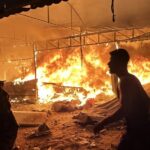
This Tuesday, the decision of YPF and its Malaysian partner Petronas to build their Liquefied Natural Gas (LNG) plant in Punta Colorada, in Río Negro, was announced. In this way, the option of installing it in Bahía Blanca, in the province governed by Axel Kicillof, was set aside, a project that had originally been made official on September 1, 2022 to be built in the city of Buenos Aires.
“It is a very serious matter, an irresponsibility of the President of the Nation, a whim for ideological reasons that puts at risk a very important project for the country,” said Axel Kicillof this Wednesday, in a press conference from La Plata. The anger of the Peronist governor is not due to the fact that the gas will be sold abroad without paying any tax or because the country is not advancing in an energy transition that allows it to reduce environmental pollution, on the contrary, his concern is due to not keeping the transitory income from the mega business project.
Kicillof criticized the national government’s policy, stating that “Milei cannot stand having lost the three elections in the province of Buenos Aires.” He added: “That is why it is not news that he has taken this investment from us. This is the path he chose: to take revenge on everyone who does not support him.” Axel’s wish is to be able to engage in dialogue with the President and negotiate the entry of funds to the province. In the electoral campaign, Peronists denounced that fascism could win and now instead of confronting it, they are angry because Milei favors the governors who aligned themselves with his administration.
Even the Buenos Aires Legislature was considering a bill to promote large investments, which sought to guarantee some of the conditions demanded by YPF and Petronas, in order not to lose the fight and to ensure that the LNG plant is located in the port of Bahía Blanca. This international agreement is claimed as his own by Governor Kicillof, who was in charge of reminding that it was after the semi-nationalization of YPF, and the exploitation of Vaca Muerta through the agreement with Chevron that the exploitation of gas was enabled. It is worth remembering the onerous nature of this agreement, which included secret clauses, enabled the creation of off-shore companies to facilitate the flight of dollars by the North American firm, and required a tailor-made decree by CFK herself to reduce withholdings and guarantee a certain availability of foreign currency.
The new venture is a great deal for foreign capital, which Peronism has been working on since 2012. It involves an investment of between 30 and 50 billion dollars, one of the largest in history. However, these investments would enter the country at least after 2025 and thanks to the benefits granted, they can be recovered by Petronas in a short time, as there is no limit to transfer them abroad.
A profitable business for multinationals and not for social needs
This project, in which Petronas is a part, has been in existence for over a decade. In the last years of Fernández’s administration, progress was made on agreements, including the partial approval by the House of Representatives of the Law for the promotion of LNG, which also focused on the benefits of the reduction or elimination of withholdings and the availability of foreign currency.
While almost half of the country’s households do not have access to the gas network, the installation of the LNG plant is not intended to solve the needs of internal supply; on the contrary, thanks to polluting extractivism, what is sought is to obtain profits to pay the debt. The LNG plant does not seek to solve the energy needs of the population, but to comply with the mandate that states that to pay the external debt, dollars must be collected by exporting more. But with the contradiction that the companies that build the plant must not leave a single dollar in the country.
The first LNG exports would occur from 2027. 3 years. What happens three years after entering the RIGI? Companies stop paying export withholdings (0%), and are exempt from the obligation to liquidate or enter the country 100% of the foreign currency. pic.twitter.com/8ToymfUBLX
— Esteban Martine (@EstebanBMartine) July 31, 2024
According to the companies, LNG exports would only occur from 2027, in 3 years. The law guarantees them, from the second year of joining the RIGI, total exemption from export duties, i.e. 0% withholdings, and free availability of 100% of the foreign currency obtained. Something similar happens with Profits and VAT.
Even if the State were to require that 10% of the LNG produced be destined for the domestic market in the winter months, i.e. those in which there is a gas shortage, the RIGI removes the obligation to comply with local supply.
With projects such as the LNG plant, designed to last half a century or more, our country’s fossil energy matrix, which is 80% based on hydrocarbon exploitation, is far from beginning an energy transition. The fracking model in Vaca Muerta continues to deepen, contaminating millions of liters of water per well, accumulating thousands of tons of toxic waste, causing earthquakes and polluting the air. The extractivist model and the plundering of natural common goods are deepening.
Thanks to polluting extractivism, what is sought is to obtain dollars to pay the fraudulent debt, while companies are going to obtain multimillion-dollar sums, estimated at around 30 billion dollars in exports per year. A law that guarantees for 30 years “the right to export all authorized volumes continuously and without interruptions or restrictions, reductions or redirections for any reason.” Almost a promotion of shortages. This can lead to the ridiculousness of a company exporting LNG and creating a shortage of supplies in the domestic market at the same time as LNG is imported, which is charged up to 10 times more than natural gas produced in the country.
Far from expanding the hydrocarbon frontier, it is necessary to nationalize the energy industry with the control of its workers and communities, together with professionals and experts from public universities, to initiate a truly fair transition from below. Centralized planning in a single state company, and obtaining financing through non-payment of the external debt, the removal of subsidies to oil companies, must be combined with decentralized deliberation in each region. In this way, the convenience, in each case, of using different sources of generation could be evaluated, taking advantage of the climatic conditions of each area, and rationally planning the use of natural common goods necessary for the use of intermittent renewable sources in their generation.
This measure could help diversify the energy matrix while ensuring access to energy for the entire population.
Source: www.laizquierdadiario.com

